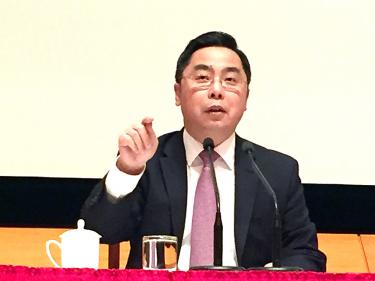The day US Navy vessels arrive in Kaohsiung would be the day the Chinese People’s Liberation Army “unifies” Taiwan by force, said Li Kexin (李克新), minister at the Chinese embassy in the US.
Li made the remarks on Friday at an explanatory session at the Chinese embassy in Washington about the Chinese Communist Party’s 19th National Congress and US President Donald Trump’s visit to China last month.
The Taiwan issue is still a challenge to US-China relations, Li said, adding that the US’ National Defense Authorization Act (NDAA) passed by the US Congress — which enables mutual visits between Taiwanese and US naval vessels — violates the basic spirit of the establishment of diplomatic relations between the US and China.
As of Nov. 16, the NDAA for next fiscal year has been passed by both the US House of Representatives and the US Senate, and is awaiting Trump’s signature to become law.
Li said he went to the US Capitol and told US officials that “I may have to thank you American friends,” adding that the officials asked what he meant with those words.
“I said: ‘Are you not going to send military vessels to Taiwan, to Kaohsiung...? If you send military vessels over there, [you] will activate the Anti-Secession Law [of China],” Li said on Friday.
Li said he was not joking, adding that US military vessels need to obtain China’s approval to visit Shanghai and if they want to visit Taiwan, China will definitely disapprove.
Citing Taiwanese human rights advocate Lee Ming-che’s (李明哲) conviction by a Chinese court for “subversion of state power,” General Association of Chinese Culture deputy secretary-general Chang Tieh-chih (張鐵志) being denied entry to Hong Kong and the increased frequency of Chinese military aircraft flying around Taiwan, Taiwanese journalists in attendance asked Li whether the incidents suggest that China’s policy toward Taiwan has tightened.
Li said that they were all individual cases and do not need to be “over-analyzed.”
Chinese President Xi Jinping’s (習近平) talk of “one China, 1992 consensus” (一個中國、 九 二共識) at the congress suggests that he has left the door open for cross-strait talks.
The “spiritual union” (心靈契合) Xi mentioned at the congress means that integration between the two sides of the Taiwan Strait is not a completely forceful one and that China wants Taiwanese to feel that “unification will let your feeling of a ‘small happiness’ (小確幸) turn into a ‘great happiness’ (大確幸),” Li said.
Peaceful unification is the highest goal, but China will not give up the option of unification by military force, Li said, adding that cross-strait relations are none of the US’ business and do not need to rely on the mediation of any other nation.
The Ministry of Foreign Affairs in Taipei yesterday said although the government welcomes and appreciates the US Congress’ demonstration of goodwill and support for improved Taiwan-US security cooperation through legislation, it cannot speak on Washington’s behalf about how it intends to execute the Taiwan-friendly elements of the NDAA.
Reiterating the Democratic Progressive Party (DPP) administration’s cross-strait stance, the ministry said the government is determined to push for peaceful and stable development of cross-strait ties and resolve differences through dialogue.
The Mainland Affairs Council also issued a statement highlighting the nation’s capability and determination to defend itself, adding that it would continue to reinforce communication with the US and its regional partners to ensure peace and stability across the Taiwan Strait.
Meanwhile, Chinese Nationalist Party (KMT) Culture and Communications Committee deputy director-general Hung Meng-kai (洪孟楷) said that the KMT would not tolerate any threats or finger-pointing aimed at the Republic of China’s homeland or the security of its people.
The DPP administration should face up to the importance of maintaining peaceful cross-strait relations and avoid any unnecessary misunderstandings that could cause irrepressible losses to Taiwan, he added.
Additional reporting by Stacy Hsu
Source: Taipei Times - 2017/12/10





















